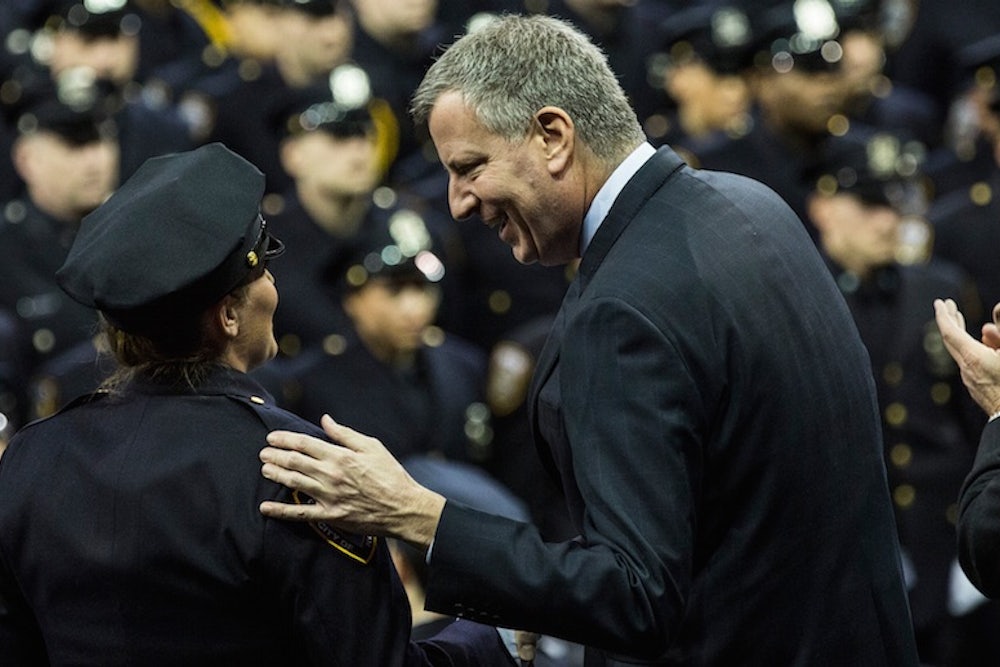On Saturday, tens of thousands of police officers from across the country gathered at a Queens church to pay final respects to Rafael Ramos, one of the two New York City police officers murdered a week earlier. In a eulogy that evoked another “time when divisive politics polarized the city and the country,” Police Commissioner William Bratton spun racism charges against the NYPD on their heads, arguing “these officers were killed for their color—they were killed because they were blue.”
Bratton’s remarks were more nuanced than much of what’s been said since Ramos and his partner Wenjian Liu were murdered. Patrolmen's Benevolent Association President Patrick Lynch charged that there was “blood on many hands,” particularly that of protesters and leaders in City Hall. A chorus of law-and-order hawks including former New York Mayor Rudy Giuliani and former Governor George Pataki assailed de Blasio and other critics of the NYPD for creating the hostile environment that birthed the murders. Officers have turned their backs on Mayor Bill de Blasio no less than three times in the past week, and some booed and jeered him at Monday's police academy graduation.
In progressive circles, these voices have largely been dismissed as alarmist ideologues. In The New Republic alone, Claire Groden has labeled them “ludicrous,” Brian Beutler “comical,” and Sam Eifling “contemptible politics.” Lynch’s moral indictment of de Blasio is repulsive, but these quick dismissals of any and all linkage between the rhetoric of protest and the cop killings isn’t quite right either. Tracing causation and assigning guilt are an exceedingly messy business—and the two concepts do not always overlap. If both right and left could learn to handle them with a bit more consistency—rather than trotting them out or waving them away whenever politically useful—we might just restore a little sanity to the public sphere.
Forty years ago, when anarchists attacked banks, conservatives condemned the anti-war movement. When Congresswoman Gabby Giffords was shot in an Arizona parking lot, liberals denounced Sarah Palin for her confrontational rhetoric rather than focusing on the shooter’s mental illness (a factor that has suddenly become very important to liberals given the psychological history of Ramos and Liu's killer, Ismaaiyl Brinsley). And when Eric Garner was killed by a policeman’s chokehold, protesters indicted police racism and NYPD’s “broken windows” approach to policing. (“Broken Windows Policing Kills People; Senseless deaths are a predictable result of cracking down on minor offenses” was Slate's fairly representative headline.) The critiques of de Blasio and protesters are thus just another manifestation of a standard trope in American politics: one side in a heated political debate seizes on extreme behavior taken by partisans of the other, and declares those actions symptomatic of structural forces or a toxic atmosphere created by the other side.
Most of the time, these charges reek of political opportunism. It is too convenient to delegitimize an entire opposing camp by focusing attention on its violent fringe. Any ideology, political position, or policing policy spawns extremists and abuses. If we reduced every revolutionary movement to its terrorists, there would never have been a just revolution. So what better way to avoid addressing the actual validity of your opponents’ arguments than to blame those arguments for the murders of innocents?
To be sure, it would be dishonest—and inconsistent—to ignore the role of mainstream cultural forces in the perverted acts of the individual. The deranged few tend to draw inspiration and support from wider social pathologies; this is a truth recognized across the political spectrum, and some charges of linkage are genuinely offered in good faith. Reasonable people can theorize that the subtle subtexts of patriarchy create fertile ground for sexual assault, that sympathy for political Islam inspires terrorism, and that nationalist rhetoric breeds attacks against minorities and immigrants.
But even as we acknowledge the causal relationship between the rhetoric of the protester and the crime of the lunatic, distinctions must still be drawn. Not every cause carries guilt, especially when the effects are distant and unforeseeable. As Ross Douthat wrote in The New York Times after Giffords was gunned down by Jared Loughner, motives for American political assassins tend to be “irreducibly complex" and "[v]iolence in American politics tends to bubble up from a world that’s far stranger than any Glenn Beck monologue… These are figures better analyzed by novelists than pundits.”
There will always be subtle changes in stimulus that might have prevented a criminal from acting. Perhaps Brinsley would never have murdered those two cops if not for the legitimacy that some public officials lent to anti-police vitriol; then again, perhaps he might not have murdered them if his troubled relationship with Shaneka Thompson, whom he had shot earlier that day, had gone differently. The mere fact that one event was a necessary precondition to a later crime cannot itself produce blame. De Blasio’s vociferous criticism of the NYPD during, and since, his election campaign may have helped create the atmosphere that inspired Brinsley, but that chain of causation is too long and too contingent to claim bloodguilt on the steps of City Hall. And so are the chains that lead from “rape culture” to specific rapes, or from "broken windows" to the killing of Garner.
Understanding and acknowledging those causal chains is still crucial. They guide policy prescriptions and add weight to calls for reform. But it is a sick political discourse where every call for change must be accompanied by condemnation.
